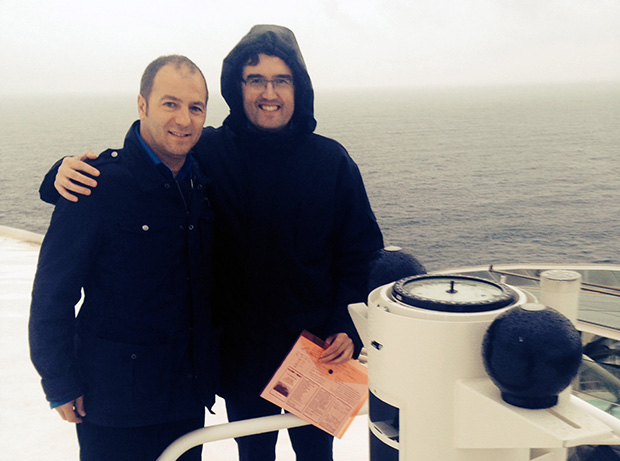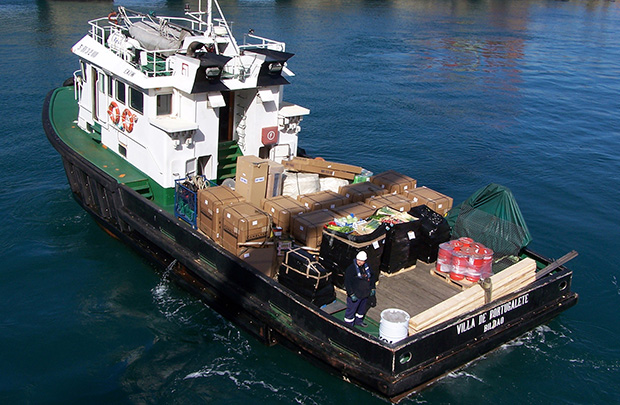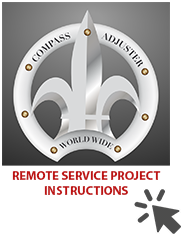
Aitor Martinez and Josu Arribalzaga, teachers at the Technical Naval Engineering School and Naval Machinery of the UPV/EHU (University of the Basque Country), are determined that the master compass on all boats continue to increase in accuracy. To do this, they are promoting a project called Compass Adjuster Worldwide, uniting professionals dedicated to adjustments and that have developed a patent for determining the error (deviation) of these instruments in real time, while the ship is sailing.
Ships today have two systems for obtaining the true heading (gyro compass and satellitar). But if there happens to be a mishap or an electronic failure,the course can be obtained in a traditional way, using the magnetic compass(like a compass) and the calculation system developed by the English mathematicianArchibald Smith in the eighteenth century. All boats must be supplied under the duly compensated regulatory compass law. This system has the advantage that it can be used when the rest of the electronics in the ship fails and with the disadvantage that it must be periodically compensated by hand.
This periodic adjustment, which can be performed by the captain, is usually handled by external specialists due to its complexity. Aitor and Josu offer that service through Euskoiker as a knowledge transfer activity between university and company. It is a service required by both small and large ships. In May of this year, for example, with the collaboration of Jokin Alberdi, they have compensated and certified the magnetic compasses of the well known"Txinbito" of the Port of Bilbao Moor as well as the"Allure of the Seas"of the Royal Caribbean,the largest transatlantic in the world. The manoeuvres necessary to compensate the latter were performed for just over an hour and a half after leaving the Port of Barcelona bound for Civitavecchia.
The "Integral Magnetic Compass" patent
Not content with offering this service, the UPV/EHU teachers have licensed the "Integral Magnetic Compass" patent developing software that records the compass offsets as the ship sails. Although, to the relief of compensators around the world this does not eliminate the periodic need for manual adjustment by a certified personnel,it allows the boat to save time, fuel, port fees, mooring, pilots and tugs, among others,since it collects the necessary data for compensation as it navigates. "If you lose two hours before leaving with manoeuvres to have good compensation," Josu was saying, "you have to spend more fuel and force the machines more to meet your ETA (estimated time of arrival). That translates to money spent by the company, so our system is a considerable savings. "
Currently, the company Autonautic Instrumental has license of said patent from the UPV/EHU and Ricardo Lopez, from Ritmas Informática, is the IT expert responsible for the development of the application in close cooperation with Aitor and Josu. The goal is to transform the patent into a commercial product that, over the years, becomes the standard as complementary equipment to the magnetic compass on boats.
At the moment, the equipment is installed aboard the "Villa de Portugalete" of the Port of Bilbao Moor to continue with the testing and improvements. Previously they were on the ship "Sorolla" of the Compañía Trasmediterranea (Acciona), on the tugboat "Cambrils" of Renave, the ship Ibaizabal, and the oceanographic ship "Sarmiento de Gamboa" of the CSIC (Higher Centre for Scientific Research).
A forum of specialists in compensation
 In addition, to complement the system with real-time data, Aitor and Josu founded the project Compass Adjuster Worldwide: a forum for professionals in master compass compensation. The project serves different purposes. On the one hand, the platform can assist captains and pilots in the distance. On the other hand, it diverts the performance of the compensation to the local professional who is in the port in question.
In addition, to complement the system with real-time data, Aitor and Josu founded the project Compass Adjuster Worldwide: a forum for professionals in master compass compensation. The project serves different purposes. On the one hand, the platform can assist captains and pilots in the distance. On the other hand, it diverts the performance of the compensation to the local professional who is in the port in question.
In addition, perhaps the most interesting aspect for researchers is that through this forum they receive data that allows them to study the behaviour of compasses in time. Both Aitor and Josu worked 19 and 15 years (respectively) as officers in the merchant marine before teaching at the UPV/EHU. Their previous experience was crucial to develop these projects. In September Aitor begins his twelfth year teaching at the UPV/EHU and Josu his fifth. For both, the contact with the professional world is essential for the university and Aitor, in particular, explained: "We try to make the students see that there is also a professional world in research, beyond obtaining a degree and offering their skills as sailors."
Do you need an expert? Contact us
What is the benefit of contracting projects with companies?
¿Cómo puedo contratar proyectos con la Universidad?
Euskoiker has more than 30 years of experience managing all kinds of projects